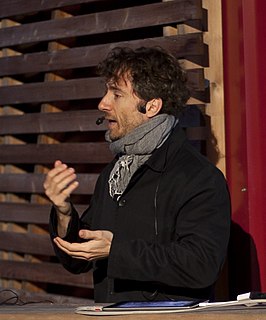A Quote by Robert Hass
Poetry had in the hands of various people become a place for inconvenient knowledge insofar as it was a place for knowledge at all. But it was a place where you could talk about other kinds of experience than the official version.
Related Quotes
Without a complex knowledge of one's place and without the faithfulness to one's place on which such knowledge depends, it is inevitable that the place will be used carelessly, and eventually destroyed. Without such knowledge and faithfulness, moreover, the culture of a country will be superficial and decorative, functional only insofar as it may be a symbol of prestige, the affectation of an elite or "in" group.
I had no one to help me, but the T. S. Eliot helped me. So when people say that poetry is a luxury, or an option, or for the educated middle classes, or that it shouldn’t be read at school because it is irrelevant, or any of the strange stupid things that are said about poetry and its place in our lives, I suspect that the people doing the saying have had things pretty easy. A tough life needs a tough language – and that is what poetry is. That is what literature offers – a language powerful enough to say how it is. It isn’t a hiding place. It is a finding place.
A community is the mental and spiritual condition of knowing that the place is shared, and that the people who share the place define and limit the possibilities of each other's lives. It is the knowledge that people have of each other, their concern for each other, their trust in each other, the freedom with which they come and go among themselves.
In a mad moment, my family and I purchased a home in Maine because it's the place in the world that my wife loves better than any other place or any other human, and so I have committed my life and what had once been my economic security that has now returned to insecurity, to a patch of painful, rocky land on the shores of horrible, cold waters to a place where people go in the summer to experience autumn because leaves start falling on August 1.
The Great Society is a place where every child can find knowledge to enrich his mind and to enlarge his talents. It is a place where the city of man serves not only the needs of the body and the demands of commerce but the desire for beauty and the hunger for community. It is a place where men are more concerned with the quality of their goals than the quantity of their goods.
You said you knew the perfect place to run to. A place that was empty of people, and buildings, and far, far away. A place covered in blood-red earth and sleeping life. A place longing to come alive again. It's a place for disappearing, you'd said, a place for getting lost... and for getting found. I'll take you there, you'd said. And I could say that I agreed.
The difference between a path and a road is not only the obvious one. A path is little more than a habit that comes with knowledge of a place. It is a sort of ritual of familiarity. As a form, it is a form of contact with a known landscape. It is not destructive. It is the perfect adaptation, through experience and familiarity, of movement to place; it obeys the natural contours; such obstacles as it meets it goes around.
I’ve had that kind of experience myself: I’m looking at a map and I see someplace that makes me think, ‘I absolutely have to go to this place, no matter what’. And most of the time, for some reason, the place is far away and hard to get to. I feel this overwhelming desire to know what kind of scenery the place has, or what people are doing there. It’s like measles - you can’t show other people exactly where the passion comes from. It’s curiosity in the purest sense. An inexplicable inspiration.





































